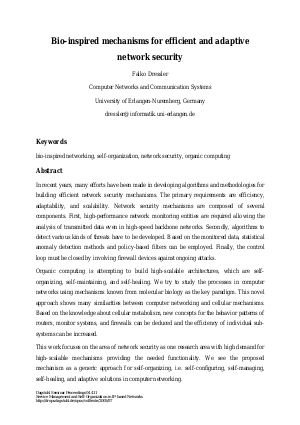Bio-inspired mechanisms for efficient and adaptive network security mechanisms
Author Falko Dressler
-
Part of:
Volume:
Dagstuhl Seminar Proceedings, Volume 4411
Part of: Series: Dagstuhl Seminar Proceedings (DagSemProc) - License:
 Creative Commons Attribution 4.0 International license
Creative Commons Attribution 4.0 International license
- Publication Date: 2005-03-24
File

PDF
DagSemProc.04411.5.pdf
- Filesize: 112 kB
- 6 pages
Document Identifiers
Subject Classification
Keywords
- bio-inspired networking
- self-organization
- network security
- organic computing
Metrics
- Access Statistics
-
Total Accesses (updated on a weekly basis)
0Document
0Metadata
Abstract
In recent years, many efforts have been made in developing algorithms and methodologies for building efficient network security mechanisms. The primary requirements are efficiency, adaptability, and scalability. Network security mechanisms are composed of several components. First, high-performance network monitoring entities are required allowing the analysis of transmitted data even in high-speed backbone networks. Secondly, algorithms to detect various kinds of threats have to be developed. Based on the monitored data, statistical anomaly detection methods and policy-based filters can be employed. Finally, the control loop must be closed by involving firewall devices against ongoing attacks. Organic computing is attempting to build high-scalable architectures, which are self-organizing, self-maintaining, and self-healing. We try to study the processes in computer networks using mechanisms known from molecular biology as the key paradigm. This novel approach shows many similarities between computer networking and cellular mechanisms. Based on the knowledge about cellular metabolism, new concepts for the behavior patterns of routers, monitor systems, and firewalls can be deduced and the efficiency of individual sub-systems can be increased. This work focuses on the area of network security as one research area with high demand for high-scalable mechanisms providing the needed functionality. We see the proposed mechanism as a generic approach for self-organizing, i.e. self-configuring, self-managing, self-healing, and adaptive solutions in computer networking.
Cite As Get BibTex
Falko Dressler. Bio-inspired mechanisms for efficient and adaptive network security mechanisms. In Service Management and Self-Organization in IP-based Networks. Dagstuhl Seminar Proceedings, Volume 4411, pp. 1-6, Schloss Dagstuhl – Leibniz-Zentrum für Informatik (2005)
https://doi.org/10.4230/DagSemProc.04411.5
BibTex
@InProceedings{dressler:DagSemProc.04411.5,
author = {Dressler, Falko},
title = {{Bio-inspired mechanisms for efficient and adaptive network security mechanisms}},
booktitle = {Service Management and Self-Organization in IP-based Networks},
pages = {1--6},
series = {Dagstuhl Seminar Proceedings (DagSemProc)},
ISSN = {1862-4405},
year = {2005},
volume = {4411},
editor = {Matthias Bossardt and Georg Carle and D. Hutchison and Hermann de Meer and Bernhard Plattner},
publisher = {Schloss Dagstuhl -- Leibniz-Zentrum f{\"u}r Informatik},
address = {Dagstuhl, Germany},
URL = {https://drops.dagstuhl.de/entities/document/10.4230/DagSemProc.04411.5},
URN = {urn:nbn:de:0030-drops-870},
doi = {10.4230/DagSemProc.04411.5},
annote = {Keywords: bio-inspired networking , self-organization , network security , organic computing}
}
